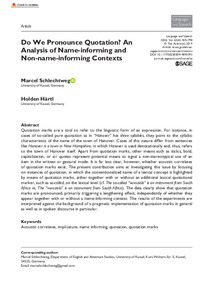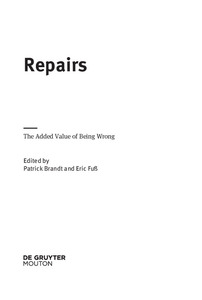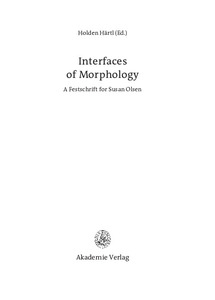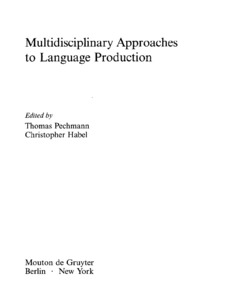Suche
Anzeige der Dokumente 1-5 von 5
Aufsatz
 Do We Pronounce Quotation? An Analysis of Name-informing and Non-name-informing Contexts
Do We Pronounce Quotation? An Analysis of Name-informing and Non-name-informing Contexts
(2019-12-23)
Quotation marks are a tool to refer to the linguistic form of an expression. For instance, in cases of so-called pure quotation as in “Hanover” has three syllables, they point to the syllabic characteristics of the name of the town of Hanover. Cases of this nature differ from sentences like Hanover is a town in New Hampshire, in which Hanover is used denotationally and, thus, refers to the town of Hanover itself. Apart from quotation marks, other means such as italics, bold, capitalization, or air quotes represent ...
Teil eines Buches
 Generic rescue: argument alternations the monotonicity condition
Generic rescue: argument alternations the monotonicity condition
(De Gruyter Mouton, 2013)
Generic interpretations as in “The tiger kills to survive” have often been observed to reconstitute the linguistic acceptability of certain verb argument structure modifications. But can the right context rescue everything? This paper investigates the impact a generic interpretation can have on three types of argument alternations: (i) the intransitive use of inherently telic verbs like “to kill”, (ii) the intransitive use of stative verbs like “to love”, and (iii) middle alternations like “it reads easily”. It will ...
Teil eines Buches
 Semantic non-transparency in the mental lexicon
Semantic non-transparency in the mental lexicon
(De Gruyter, 2015)
The notion of “Eigentlichkeit” (‘authenticity’), when approached from a perspective of language philosophy, is associated with the quality of linguistic entities of referring to things in the world in a truthful and a maximally transparent way, cf. Gardt (1995). Obviously, there are numerous expressions that do not seem to conduct themselves accordingly and display a rather “non-authentic”, i.e., non-transparent behavior instead, like indirect and ironic speech acts or idiomatic expressions like Cat got your tongue? ...
Teil eines Buches
 Arguments of non-heads
Arguments of non-heads
(Akademie Verlag, 2013)
The current paper investigates these cases from a lexicalist perspective. In particular, I will discuss whether realizations of arguments of non-heads of the above types are based on a regular grammatical process or not. I will argue that this is the case indeed with constructions of the type Designanalyse des Geschirrs, where the post-nominal element figures as argument of both the head as well as the non-head. In contrast, (prepositional) external argument realizations of the type in (1)—i.e. constructions in which ...
Teil eines Buches
 Thematic information, argument structure, and discourse adaptation in language production
Thematic information, argument structure, and discourse adaptation in language production
(Mouton de Gruyter, 2004)
In the minds of language users, situations are represented as states, processes, and events. Each such representation originates from perception, imagination, or illusion (cf. e.g., Glasersfeld 1972) and includes the partaking entities and the respective relations holding between them. Since situations cannot be represented by linguistic means in all their aspects, verbalization always requires schematization, i.e. the reduction of information. In the consequence, in linguistic expressions some of the information ...




